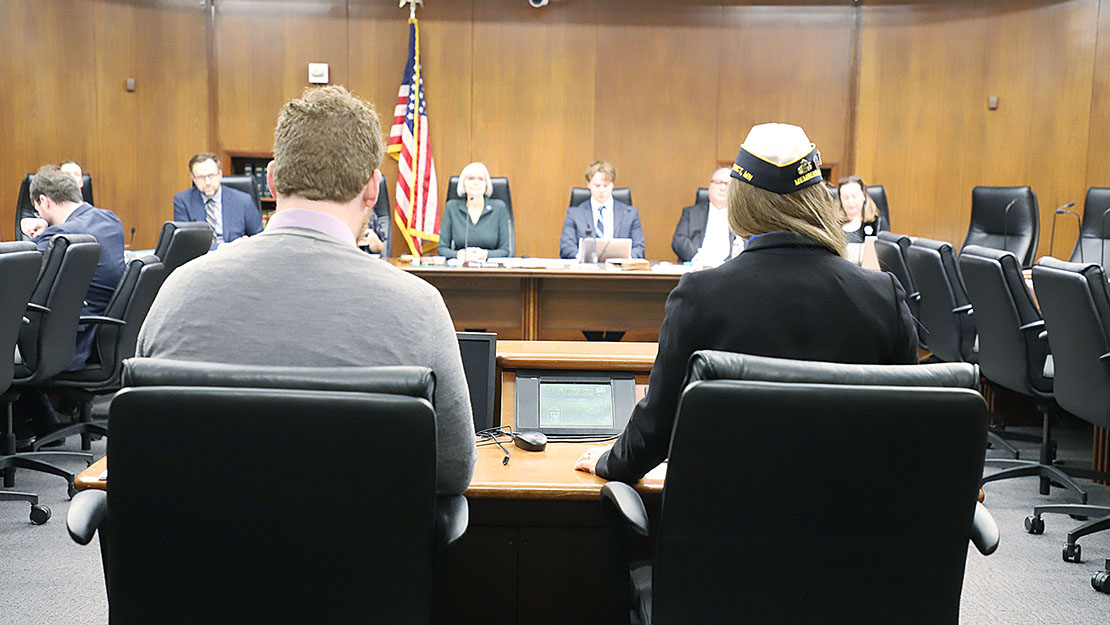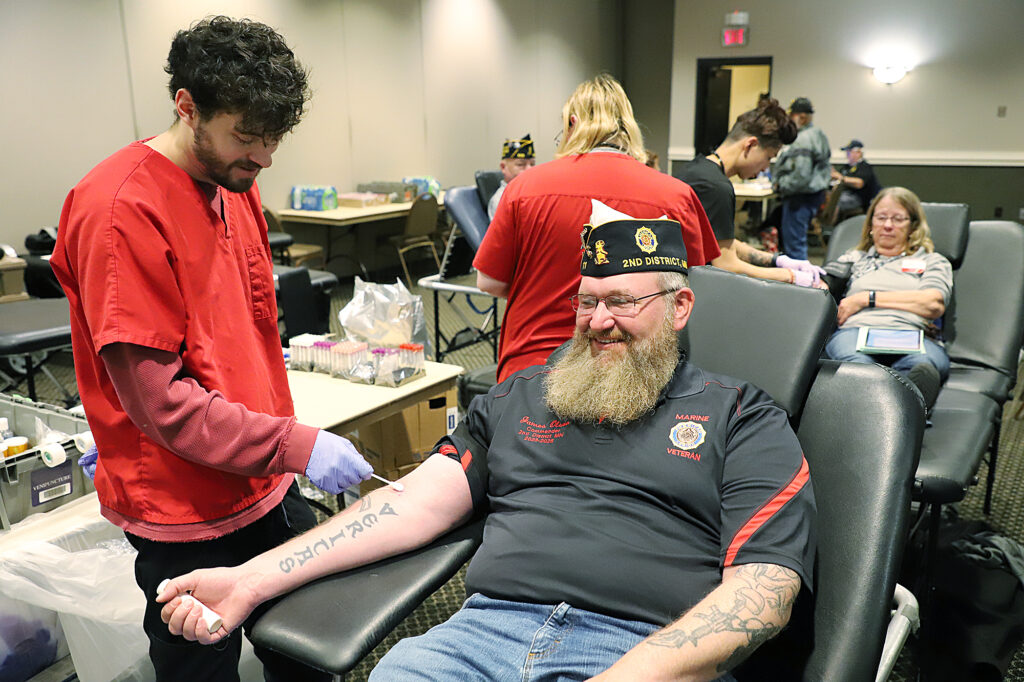Minnesota American Legion 2025 Legislative Priorities

The 2025 Minnesota Legislature convenes Jan. 14. The annual legislative priorities issued by the Minnesota American Legion help members know which measures are being pushed this session so they can talk fluently with local lawmakers about them.
These Minnesota American Legion priorities for 2025 were approved by the Department Executive Committee on Oct. 24:
Bring back the Veterans Affairs committees for both chambers
Over the spring and summer months, Minnesota lawmakers told veterans that our Legislature needs to bring back a Senate Veterans Affairs Finance & Policy Committee, which they got rid of in 2023. In November 2024, House leadership did away with the House Veterans Affairs Finance & Policy Committee, too. This is absolutely unacceptable. Why is it state government spending totals increase by $20 billion (around $41B in 2019 to $61B in 2024) and yet the state cannot staff legislative committees for the men and women who served? Restore our committees.
Protect veterans from consumer fraud and claim sharks
Consumer fraud and aggressive practices targeting veterans’ VA benefits compensation are on the rise. Few insults are more egregious than to take advantage of disabled veterans or their families. The American Legion at the national level wants the return of criminal penalties enforced against these non-accredited violators. While the federal government is in gridlock on whether or not to pass the GUARD Act (S. 740 and H.R. 8736), states like New Jersey are beginning to pass their own legislation to protect veterans. The American Legion Department of Minnesota believes this issue is too important to wait for the federal government to act. We worked with the Legislature on draft language (CS144-5005671173743550781) to empower veterans to recover damages from these illegal practices and hope to see the bill pass this year.
Reduce state taxes on charitable gambling
We call on lawmakers to provide meaningful tax relief for Minnesota charities. Our posts pay more in taxes than they give to the charities they support, which leaves less revenue for us to support our communities. Last year, The American Legion Department of Minnesota worked with lawmakers on a bill (HF 2000, SF1949) that would have dedicated a percentage of legal sports betting state tax revenue to provide rebates to charitable gambling operations. The bill died in the final hours of the 2024 session. We commend the authors for the progress they made last year, as it brought us closer than we have been in more than a decade to getting much needed tax cuts. Let’s get this measure across the finish line in 2025.
Other gambling priorities:
Expand lawful purpose expenditures for post homes
Many of our posts are very old, in disrepair and have limited means to complete large capital projects such as roof repairs or parking lot resurfacing. Often charitable gambling is the only source of revenue for these projects. The state limits lawful purpose expenditures on these projects to a small percentage of annual gambling revenues. Last year, lawmakers tried to include lawful purpose expansion to 50 percent of annual gambling revenue for congressionally chartered veterans service organizations. Two separate pieces of legislation included this measure, the sports betting bill (HF2000) and the House tax omnibus bill (HF5247), but both efforts failed in the final hours of the 2024 session. We ask lawmakers to reintroduce this measure, without a sunset or expiration date, to ensure our continued presence in communities across Minnesota into perpetuity.
Increase amount posts can spend on meals recognizing veterans
The $5,000 annual cap on how much posts can spend from gambling for meals held in recognition of military service is no longer reasonable. This amount was set by the Legislature in 2002. It is MS 349.12, Subd. 25(17). We feel this figure should be $15,000 so that it meets modern-day cost of meals for present and future needs. Let’s do right by our veterans and make this simple change.
Modernize the Disabled Veterans Homestead Market Value Exclusion
Currently, there are two levels of property tax exclusions. The exclusion values have not changed in over 10 years while home values have dramatically risen, reducing the impact of this benefit. The first level is a maximum exemption of $150,000 for veterans rated by the VA as 70 to 100 percent disabled. The second level of exclusion is for 100 percent permanent and total (100 percent P&T) disabled veterans at $300,000. We wish these amounts to be increased to $200,000 (base level) and $400,000 (double the base level), respectively. The new values need to be indexed to inflation. We need a technical fix to remove the word “honorable” from the statute. Counties should not re-adjudicate veterans’ character of service, since the federal VA has already deemed the service honorable for disability compensation purposes. In 2024, House lawmakers introduced a bill (HF4259, no Senate companion) including all the provisions we hope to become law. We cannot allow Minnesota veterans to lose their homes as prices continue to skyrocket and the property-tax exclusion benefit becomes less and less effective.
Modernize the Surviving Spouse Homestead Market Value Exclusion
There are several areas of the current market value exclusion statute that are unfavorable to surviving spouses and exclude them from receiving the benefit. First, we support the removal of the equal or lesser value language for surviving spouses. It is often more expensive to downsize from a large home that is already paid off to a smaller home, town home, or a condo. Second, the present law, MS 273.13, Subd. 34(d), says the surviving spouse must file within two years of the death and must live in the home at the time of the death. In 2021, we got rid of most of the time limits, but we should finish the job and remove all time limits for surviving spouses applying for the benefit. Third, the law discriminates against active-duty spouses and would help only Minnesota National Guard or Reserve spouses. Active-duty spouses likely live on or near out-of-state bases when their spouse dies in service to the country. When they return to Minnesota, they find they do not qualify for the Gold Star property-tax exemption. This is not in the spirit of our state’s support for veterans and their families. Lastly, we also would favor changing the law to allow the spouse to remarry and retain the benefit. Veterans who have passed on would want their loved one to find happiness in their absence. We have worked with lawmakers and research staff on draft language (JS089-16475571070973784702). We hope to see this introduced as a bill in 2025 and passed into law.
Provide 100 percent property tax relief for post homes
Many 501(c)(3) nonprofit organizations received property tax exemptions after qualifying through their county assessor and going through a three-year assessment review. We desire Minnesota to give 501(c)(4) and 501(c)(19) organizations access to the same nonprofit property tax exemptions provided to 501(c)(3) nonprofits. This would reduce the disturbing trend of posts going under. There are a handful of states that provide this same benefit as a recognition of the good veteran service organizations do for their communities, and Minnesota needs to be among them. As a side benefit, a zero-tax measure would clear up much of the confusion city and county assessors statewide have regarding veteran posts and tax laws. In 2024, this bill (HF4038, SF3953) received widespread bipartisan and bicameral support but was denied hearings in both tax committees. We call on Rep. Aisha Gomez and Sen. Ann Rest to hear these bills, which are widely supported by their colleagues and Minnesotans. Let’s treat our veteran nonprofits like other nonprofits.
Offer free vehicle registration for Gold Star spouses, children
Many states do not charge vehicle registration fees for Gold Star spouses (based on the DD-1300 or DD-2064) and sometimes for their children. Minnesota should follow suit. These people have made deep sacrifices on behalf of our federal, state and local governments, and this would be the least our state could do to thank them. Last year, a bill (HF4338, no Senate companion) was introduced to make this a reality. We need to take care of our Gold Star spouses and children and get this done.
Produce a license plate for Jewish War Veterans
There are license plates for other congressionally chartered veterans organizations, such as American Legion, VFW, DAV, Amvets, Military Order of the Purple Heart and a few others, but, strangely, there is not one for the JWV, which was founded in 1896 and received its congressional charter in 1984. It’s time to fix this oversight, honor and celebrate the service of Jewish War Veterans. We support the re-introduction of the bill (HF3962, SF3456) that would add this specialty plate to our state’s list of offerings and respectfully request hearings in both chambers’ transportation committees.
Address food insecurity resources for all Minnesota veterans
The veterans omnibus bill last year and the year prior included significant funding to address veteran food insecurity through Metro Meals on Wheels. Metro area CVSOs report that one of the first steps they take after a homeless veteran is stably housed through HUD-VASH or another veteran specific resource is to sign them up for Meals on Wheels to deliver prepared frozen meals to their home. In 2024, two senators voted against the veterans omnibus bill because the funding went only to the metro area and not Greater Minnesota. Determine the level of need in rural and outstate areas and decide whether Meals on Wheels, Lutheran Social Services or another provider can address food insecurity statewide, so all Minnesota veterans have adequate nutrition.
Add 2 more Vet Centers (federal issue)
VA Vet Centers are community-based counseling centers that provide a wide range of social and psychological services, including professional counseling to eligible veterans, servicemembers, including National Guard and Reserve components, and their families. In Minnesota, we are home to almost 300,000 veterans. We have just three full-fledged Vet Center locations to serve our entire population. They are in Anoka,
St. Paul (presently in Richfield) and Duluth. A new Vet Center outstation opened in June 2024 in St. Cloud under the supervision of the Anoka Vet Center. There are huge areas of Minnesota which are underserved because of the distance to a Vet Center. We favor making the St. Cloud outstation a full Vet Center, and adding them in Mankato and Bemidji, too.
Make hearing loss and tinnitus presumptive (federal issue)
Many federal VA resources are spent on claims for hearing loss and tinnitus (ringing in the ears), whether initial claims, supplemental claims, or various types of appeals. A majority of Board of Veterans Affairs appeals dockets are consumed by hearing loss and tinnitus appeals for service connection. Consequently, the government is likely spending far more with these processes than if these claims were all granted. We propose making hearing loss and tinnitus presumptive of military service. Regardless of one’s military duties, all military personnel must learn how to use weapons, and many are routinely noise exposed. In years past, hearing protection has been absent, proven inadequate, and many times not practical to use in the field. Additionally, there is no scientific test to prove the presence or absence of tinnitus. We can influence Congress to make hearing loss (in the presence of audiometric findings) and tinnitus presumptive of military service.



